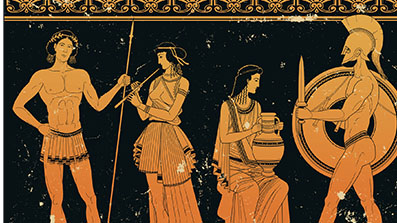To the Editor:
Johanna Hanink’s “If Classics Doesn’t Change, Let It Burn” (The Chronicle Review, February 11) should rightly strike terror in our hearts. She has given the “current incarnation of classics” an ultimatum, as did Princeton University professor Dan-el Padilla Peralta, whose work has inspired her. Do it our way or burn.
My initial thoughts went far from the West — to Guangzhou, September 1999. My wife and I were completing the adoption of our baby daughter, and our Chinese Communist Party guide was eager to take us shopping. I asked her to take us to a bookstore and explained that I wanted a poster of the Confucian Analect, “By nature the same, by habits far apart.” It was once among the first things a Chinese child learned at school. Our guide feigned incomprehension, and when I repeated the request, she grew indignant. “Why,” she asked, “do you want that old stuff?” and added, “We’re not interested in it anymore.”
I quickly realized my naivete: The Cultural Revolution had done its work, and Confucius was still unwelcome in his homeland, except, perhaps, as fodder for virtue-signaling denunciation. (Twenty-first century China seems to have woken up to its folly, at least in official policy.)
Fast forward to the current ultimatum to the classics. Forgotten is the power of the classics and the too-often dismissed “Great Books” to explore human experience, transcending race, gender, time, and place. Forgotten are the words of W.E.B. Du Bois, who reflected: “I summon Aristotle and Aurelius and what soul I will, and they come all graciously with no scorn nor condescension. So, wed with Truth, I dwell above the veil” (The Souls of Black Folk).
Forgotten, too, is the late Frank Snowden, chairman of Howard University’s Classics Department, who explored “the absence of bitter antagonism toward blacks in the ancient world” in Before Color Prejudice (1983), published by Harvard University Press. Those who threaten Classical Studies as it now exists with an auto-da-fé need to think hard about what we lose when the disciplined, unified study of Greece and Rome is fragmented into whatever can be harvested for the political fashion of the day.
Hanink is quite right to note that the humanities are under threat — perhaps not so much at Brown and Princeton — but the budgetary constraints at most other schools have grown yet more acute due to the pandemic and will undoubtedly make classics a prime target for downsizing or elimination. And, indeed, when classics is presented, quite falsely in my mind, by its own practitioners as some atavistic romp of white supremacy, diversity-conscious deans are likely to take the line of least resistance, with intellectually devastating consequences.
It is also stunning to see how freely the contemporary assault on the classics for “Eurocentricity” ignores a long scholarly tradition of looking outward from Greece to older civilizations. Walter Burkert’s writings are replete with observations about the influence of the Near East on Greek mythology. E.R. Dodds declared in his 1936 inaugural lecture as Regius Professor of Greek at the University of Oxford that classicists need a better understanding of the Near East, “learning something at first hand of that oriental background against which Greek culture arose, and from which it was never completely isolated save in the minds of classical scholars.” Classics activists seem more Oedipal than original, except in their desire to cow the academy into a nebulous sociopolitical agenda.
Classics has assuredly had its share of racists, anti-Semites, misogynists, and political opportunists of all stripes. So have medicine, mathematics, and natural science. And it is clear that all academic disciplines are making strenuous efforts, as they should, to eliminate discrimination and prejudice. Are these fields, nonetheless, to be condemned to radical restructuring, or “burning,” at whatever intellectual cost?
“Let it burn.” How ghastly a sentiment. What does that verb evoke? Perhaps it is Giordano Bruno, 421 years ago in Rome, with his tongue pegged lest he utter more heresy, tied naked and upside down to a stake and burned alive for challenging the orthodoxies of his day. Or perhaps Heinrich Heine’s prophetic warning, Dort wo man Bücher verbrennt, verbrennt man am Ende auch Menschen. “There where people burn books, they will ultimately burn people as well.” The works of Freud, Einstein, Kafka, James Joyce, Tolstoy, Joseph Conrad, and Bertolt Brecht went into the Nazi pyres.
Let us pray the denizens of our universities are not poised to find their own way to silence classics unless remade to suit their ideology. It is time to become less woke and more awake to the damage that follows as partisanship overrules scholarship.
